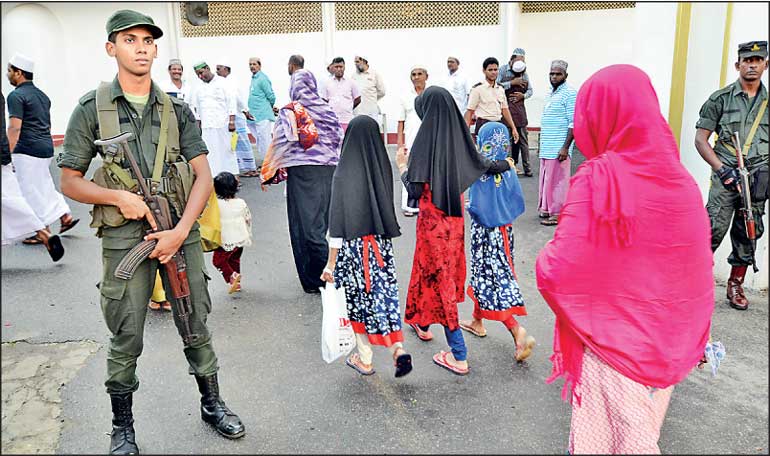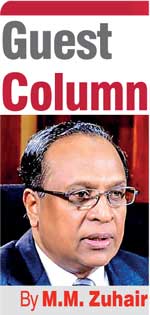Tuesday Feb 24, 2026
Tuesday Feb 24, 2026
Saturday, 27 August 2022 00:11 - - {{hitsCtrl.values.hits}}

It is time that the President and his Government do not permit unacceptable and unauthorised procedures being adopted to marginalise and ostracise minority community institutions and individuals under cover of national security – Pic by Shehan Gunasekara
 While welcoming President Ranil Wickremesinghe’s statement at the recent annual conference of the Organisation of Professional Associations (OPA) on the need to “sort out the problems among the ethnic groups, as this has gone on for too long, as the war was over in 2009 and there is no need to fight again”, it is time that the President and his Government do not permit unacceptable and unauthorised procedures being adopted to marginalise and ostracise minority community institutions and individuals under cover of national security as we fear certain measures being unlawfully pursued will enhance radicalisation and counter radicalisation in the country leading to conflicts.
While welcoming President Ranil Wickremesinghe’s statement at the recent annual conference of the Organisation of Professional Associations (OPA) on the need to “sort out the problems among the ethnic groups, as this has gone on for too long, as the war was over in 2009 and there is no need to fight again”, it is time that the President and his Government do not permit unacceptable and unauthorised procedures being adopted to marginalise and ostracise minority community institutions and individuals under cover of national security as we fear certain measures being unlawfully pursued will enhance radicalisation and counter radicalisation in the country leading to conflicts.
At this time of dire economic crisis confronting the country attributed by some, to the ‘curse of all religious groups’, the urgent need is the unity of all the communities as well as the economic support of all countries!
But why is the Foreign Ministry through its competent authority misusing, in its 1 August 2022 listing, the UN Security Council (SC) resolutions 1267 of 1999 and eight related subsequent SC resolutions including resolution 2253 of 2015, the last in the series as quoted by the Sri Lankan authorities? The clear purpose of the Security Council resolutions was to control funding the terrorist entities, originally the then Taliban and later the Al Qaida and the Islamic State of Iraq and Levant (ISIL). How can the 6 Sri Lankan organisations and 156 Sri Lankans be accused of funding any foreign terrorist entities or being associates of Al Qaida or ISIL?
Surely the Foreign Ministry has no proof that any one of these Sri Lankan entities or persons had funded the Taliban, the Al Qaida or the ISIL at any time, even though these entities, as originally resolved by the Security Council, had ceased to exist!
UN Security Council resolution 2253 of 2015 has unequivocally identified the target group of the resolution, in section 2 as the ‘ISIL’, ‘Al Qaida’ and associated individuals, groups, undertakings and entities’. The listing criteria are set out in section 3 and are far beyond any fisherman’s hook! Is it the position of the Sri Lankan Foreign Ministry that the 6 plus 156 Sri Lankan Muslim organisations and persons are associates of terror outfits, ISIL or AL Qaida, thereby exposing Sri Lanka wrongfully for actions including sanctions and damage claims by individuals, countries or the international community?
Then DIG of the CID Ravi Seneviratne gave evidence before the Parliamentary Select Committee that probed Easter Sunday attacks of 21/04/2019 that there was no evidence of any links between Sri Lanka’s Easter Sunday suicide bombers and the ISIL or the Al Qaida. The Defence Ministry has on a number of instances refuted foreign media allegations and assumptions attempting such links with foreign terror outfits. The Catholic Church has time and again pointed to elements seeking to net in the ISIS to take responsibility for the Easter attacks, for days after 21/04. The attempt was to show a non-existing link.
The 1 August 2022 listing of designated persons purportedly under Article 41 of the UN Charter is invalid and of no force or avail in law for several other reasons as well, including that Article 41 is entirely for the extraordinary UN objective of preventing wars and conflicts between nations and not to harass, humiliate or terrorise persons and organisations totally unconnected to ISIL or Al Qaida as defined in paragraph numbered 2 and the listing criteria in paragraph 3 of the Security Council resolution 2253 of 2015, not renewed thereafter because the two anti-Islamic entities have been killed and cremated.
In addition, several provisions in the gazetted regulations are violative of international laws, the provisions of the Constitution of Sri Lanka and Security Council resolution 2253 of 2015. The violations may become issues in the International Court of Justice in Hague, the UN Human Rights Council in Geneva and the Human Rights Commission of Sri Lanka in Colombo, unless the listing of Muslim organisations and individuals are promptly reviewed and cancelled.
(The writer is a former MP.)